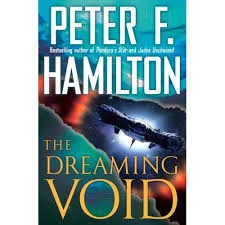Peter F. Hamilton's THE TEMPORAL VOID
Book review by Dennis D. McDonald
I love space opera, but I’m probably not going to read Book Number Three in this series. My reaction to Book Two has been pretty similar to how I responded to Book One: too long, no sympathetic characters, and a disappointing explication of the Void’s pull on so many human imaginations.
All along I’ve been puzzled by why so many have been so eager to capture the Second Dreamer and why Inigo’s Dreams were so attractive in the first place. The description of time and causality manipulation reminded me a lot of the impacts of long term usage of the Spice Melange by the Navigator Guild and others in Dune. Moreover, the ability to manipulate history and cause-and-effect would seem to be a capability that transition to Hamilton’s post mortem digital consciousness would already provide.
So, call me underwhelmed and still a bit puzzled about why so many humans are drawn to the Void, given that the only real believers we’ve really heard from are the self-aggrandizing religious zealots at the top and the silly couple who wanted to buy Araminta’s apartment.
I also suspect that the author’s ability to create and manipulate so many different characters, timelines, and technologies is beginning to wear on him. He still has the ability to craft impressive high-tech action sequences, but keeping so many many balls in the air, especially when he crosscuts the plot with the humdrum medieval world in the Void, becomes increasingly annoying. It’s as if his fantastic writing talents are responding to the need to explain and involve so many threads, not to the need to tell a ripping good yarn.
Copyright (c) 2010 by Dennis D. McDonald


